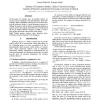Free Online Productivity Tools
i2Speak
i2Symbol
i2OCR
iTex2Img
iWeb2Print
iWeb2Shot
i2Type
iPdf2Split
iPdf2Merge
i2Bopomofo
i2Arabic
i2Style
i2Image
i2PDF
iLatex2Rtf
Sci2ools
INTERSPEECH
2010
2010
Nucleus position within the intonation phrase: a typological study of English, Czech and Hungarian
In this paper we examine cases of non-final nucleus (or sentence stress) in English, Czech and Hungarian. These three languages differ substantially with respect to word order rules, prosodic plasticity (ability to signal information structure by shifting the nucleus) and the degree of grammaticalization in nucleus position. Recordings of parallel texts are studied with the aim to quantify different categories of shifts, as well as inter-speaker agreement in the position of the nucleus.
| Added | 18 May 2011 |
| Updated | 18 May 2011 |
| Type | Journal |
| Year | 2010 |
| Where | INTERSPEECH |
| Authors | Tomás Dubeda, Katalin Mády |
Comments (0)

